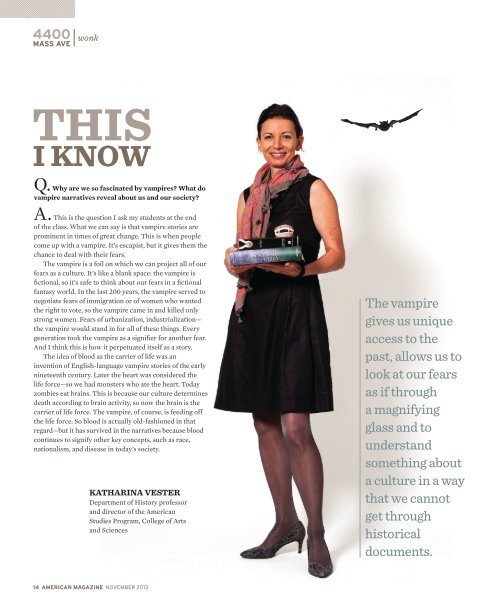You also want an ePaper? Increase the reach of your titles
YUMPU automatically turns print PDFs into web optimized ePapers that Google loves.
wonk<br />
on campus<br />
Q. Why are we so fascinated by vampires? What do<br />
vampire narratives reveal about us and our society?<br />
A. This is the question I ask my students at the end<br />
of the class. What we can say is that vampire stories are<br />
prominent in times of great change. This is when people<br />
come up with a vampire. It’s escapist, but it gives them the<br />
chance to deal with their fears.<br />
The vampire is a foil on which we can project all of our<br />
fears as a culture. It’s like a blank space: the vampire is<br />
fictional, so it’s safe to think about our fears in a fictional<br />
fantasy world. In the last 200 years, the vampire served to<br />
negotiate fears of immigration or of women who wanted<br />
the right to vote, so the vampire came in and killed only<br />
strong women. Fears of urbanization, industrialization—<br />
the vampire would stand in for all of these things. Every<br />
generation took the vampire as a signifier for another fear.<br />
And I think this is how it perpetuated itself as a story.<br />
The idea of blood as the carrier of life was an<br />
invention of English-language vampire stories of the early<br />
nineteenth century. Later the heart was considered the<br />
life force—so we had monsters who ate the heart. Today<br />
zombies eat brains. This is because our culture determines<br />
death according to brain activity, so now the brain is the<br />
carrier of life force. The vampire, of course, is feeding off<br />
the life force. So blood is actually old-fashioned in that<br />
regard—but it has survived in the narratives because blood<br />
continues to signify other key concepts, such as race,<br />
nationalism, and disease in today’s society.<br />
KATHARINA VESTER<br />
Department of History professor<br />
and director of the <strong>American</strong><br />
Studies Program, College of Arts<br />
and Sciences<br />
The vampire<br />
gives us unique<br />
access to the<br />
past, allows us to<br />
look at our fears<br />
as if through<br />
a magnifying<br />
glass and to<br />
understand<br />
something about<br />
a culture in a way<br />
that we cannot<br />
get through<br />
historical<br />
documents.<br />
EMMY-AWARD WINNING<br />
newsman Anderson Cooper is AU’s<br />
<strong>2013</strong> Wonk of the Year. The CNN<br />
journalist collected the award at a<br />
packed Bender Arena, October 19,<br />
during All-<strong>American</strong> Weekend.<br />
Lauded for his reporting from<br />
some of the most perilous places<br />
on the planet—Egypt and Syria<br />
among them—Cooper, 46, garnered<br />
widespread praise for his emotional,<br />
hard-hitting coverage of Hurricane<br />
Katrina in 2005, which helped CNN<br />
land a prestigious Peabody Award.<br />
Cooper, whose brother<br />
committed suicide in 1988, says<br />
he empathizes with other people’s<br />
suffering. “I wanted to be around<br />
other people who spoke the<br />
language of loss. I found when<br />
I went to wars, when I went to<br />
places where terrible things were<br />
happening, life felt very real there<br />
and very precious,” says Cooper<br />
“You can’t stop suffering. You can’t<br />
stop terrible things from happening,<br />
but you can bear witness.”<br />
Celebrating<br />
changemakers<br />
Honored by the Kennedy Political<br />
Union (KPU), which marks its 45th<br />
anniversary this year, Cooper<br />
is AU’s second Wonk of the Year.<br />
President Bill Clinton collected the<br />
inaugural trophy in 2012.<br />
KPU created the award to<br />
recognize a well-known individual<br />
who represents the embodiment<br />
of a wonk: someone smart,<br />
passionate, focused, and engaged<br />
who creates meaningful change in<br />
the world.<br />
14 AMERICAN MAGAZINE NOVEMBER <strong>2013</strong> LET’S TALK #AMERICANMAG 15


